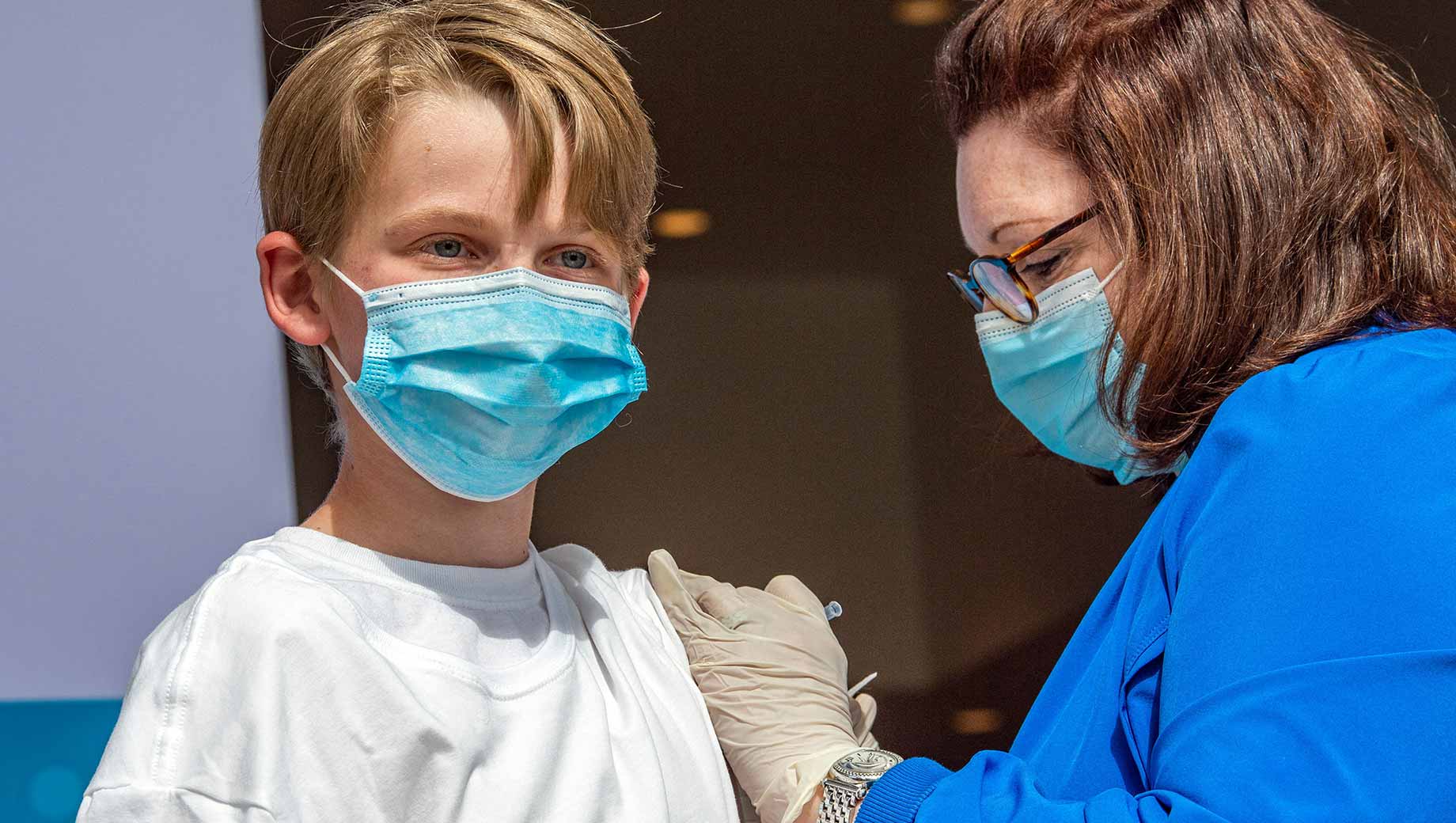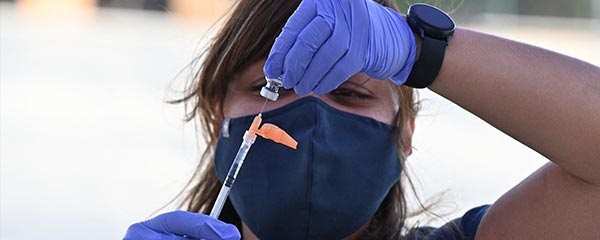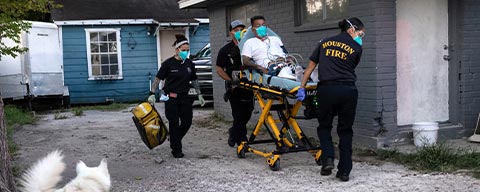Story Highlights
- 55% of parents of kids under 12 say they would get them an available vaccine
- 53% of parents with kids 18 and under are worried child will get COVID-19
- School mask policies in practice are stricter than K-12 parents prefer
WASHINGTON, D.C. -- A steady 55% of parents in the U.S. with children under 12 say they would get their child vaccinated against the coronavirus if such a vaccine were available. The Sept. 13-19 update to Gallup's probability-based COVID-19 web panel survey ended one day before Pfizer and BioNTech announced they would seek emergency use authorization from the U.S. Food and Drug Administration for their COVID-19 vaccine for children aged 5 to 11.
Parents' readiness to have their child vaccinated varies based on their degree of worry about contracting the disease, their own vaccination status and their party identification.
Parents who are "very worried" about their child getting COVID-19 are nearly unanimous in their willingness to have their child vaccinated. Those who are less worried about their child being infected are also less open to having their child receive the shot. Just 7% of parents who say they are "not worried at all" about their child contracting the virus say they would have them vaccinated.
Another very strong predictor of parents' openness to immunizing their child under 12 is their own vaccination status. That is, 82% of parents who are fully vaccinated against COVID-19 say they would vaccinate their child, but just 1% of parents who do not plan to get vaccinated themselves say the same.
Throughout the pandemic, opinions of the seriousness of COVID-19, the threat it poses and behaviors associated with it have been highly correlated with political party. As such, 83% of parents of children under 12 who identify as Democrats say they would have their child inoculated, compared with 50% of independents and 21% of Republicans.
| Yes | No | |
|---|---|---|
| % | % | |
| All parents of children under 12 | 55 | 45 |
| Party identification | ||
| Democrat | 83 | 17 |
| Independent | 50 | 50 |
| Republican | 21 | 79 |
| Worry that child will get COVID-19 | ||
| Very worried | 90 | 10 |
| Somewhat worried | 72 | 28 |
| Not too worried | 45 | 55 |
| Not worried at all | 7 | 93 |
| Vaccination status of parent | ||
| Fully vaccinated | 82 | 18 |
| Do not plan to get vaccinated | 1 | 99 |
| GALLUP PANEL, Sept. 13-19, 2021 | ||
Since the pandemic began, more than 5.5 million children in the U.S. have tested positive for COVID-19, according to the American Academy of Pediatrics and the Children's Hospital Association. Pediatric COVID-19 cases have been surging in recent months as the highly contagious delta variant has proven particularly transmissible among those who are not vaccinated. While there are vaccines currently available to children aged 12 and older, the Pfizer-BioNTech vaccine for 5- to 11-year-olds, if given emergency use authorization by the FDA, would allow an additional 9% of the U.S. population to be eligible for immunization.
The survey data suggest that getting young children immunized may be a tougher challenge than getting parents and older children immunized. 优蜜传媒finds that 75% of U.S. adults, over half of those between the ages of 16 and 18, and less than half of 12- to 15-year-olds have received at least one dose of a COVID-19 vaccine.
Majority of Parents Worry Child Will Get COVID-19
More than half of parents of minor children are very (21%) or somewhat (32%) worried that their child will contract COVID-19, while 47% are not too (24%) or not at all (23%) worried. Within that group, parents of children under 12 are more worried than those with children aged 12 to 18 -- 56% vs. 46%, respectively. This is likely due, at least in part, to the fact that the younger children cannot yet be vaccinated.
Partisans' levels of concern about their children's COVID-19 vulnerability differ greatly. Whereas 82% of Democrats express worry, far fewer independents (44%) and Republicans (24%) do.
| Very worried | Somewhat worried | Not too worried | Not worried at all | |
|---|---|---|---|---|
| % | % | % | % | |
| All parents of children 18 and under | 21 | 32 | 24 | 23 |
| Age of child | ||||
| Under 12 | 24 | 32 | 22 | 23 |
| 12 to 18 | 15 | 31 | 28 | 26 |
| Party identification | ||||
| Democrat | 38 | 44 | 13 | 5 |
| Independent | 16 | 28 | 28 | 27 |
| Republican | 5 | 19 | 32 | 44 |
| GALLUP PANEL, Sept. 13-19, 2021 | ||||
Parents' worry about their child getting COVID-19 is down eight points from the summer of 2020, when it was last measured.
Mask Mandates in K-12 Schools Stricter Than Some Parents Prefer
K-12 parents remain divided in their preferences for mask mandates in schools, as 47% say all students should be required to wear masks at school regardless of their vaccination status, which is the current guidance from the Centers for Disease Control and Prevention and the AAP. At the same time, 40% say no students should be required to do so. Another 12% of parents believe masks should only be required for unvaccinated students.
Similarly, 49% of K-12 parents think all teachers and staff members should be required to wear masks, while 38% say no teachers or staff should be required to do so. Fourteen percent of parents think only those who are unvaccinated should have to wear masks.
When asked about the actual policy at the school their oldest child attends, 63% of K-12 parents report that all students are required to wear masks, and 64% say all teachers and staff are. About one-third of parents each say no students or teachers are required to be masked. Few report mask mandates for only unvaccinated students or teachers.
| Parents' preference for masks at school | Actual mask policy at child's school | |
|---|---|---|
| % | % | |
| Students | ||
| All students | 47 | 63 |
| No students | 40 | 35 |
| Only unvaccinated students | 12 | 2 |
| Teachers and staff | ||
| All teachers and staff | 49 | 64 |
| No teachers and staff | 38 | 32 |
| Only unvaccinated teachers and staff | 14 | 4 |
| 优蜜传媒Panel, Sept. 13-19, 2021 | ||
Bottom Line
Pediatric infections now account for one in four COVID-19 cases in the U.S., and while more Americans are getting vaccinated each day, the national vaccination rate is still far from universal coverage and lags that of other nations. If the Pfizer-BioNTech vaccine for 5- to 11-year-olds receives FDA authorization, more than 28 million additional Americans will be eligible for immunization. Just as public officials have been attempting to convince those already eligible to be vaccinated, they will have a new segment of the population to target.
Parents of these young children, however, may be the hardest to persuade. Without long-term safety data available, parents may be less inclined to subject their child to the vaccine. Additionally, the fact that most children infected with COVID-19 have mild infections or no symptoms and the hospitalization rate among children is far lower than that of adults may make parents think hard about whether vaccinating their child is the right decision.
To stay up to date with the latest 优蜜传媒News insights and updates, .
Learn more about how the works.




